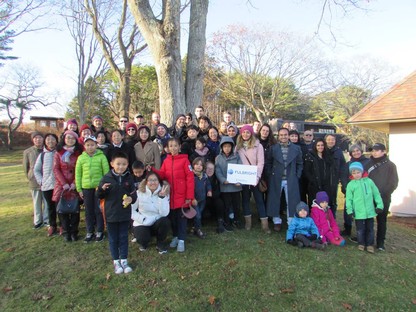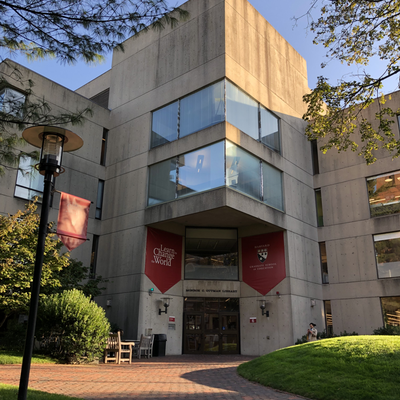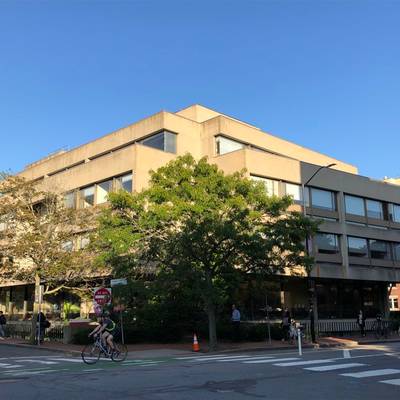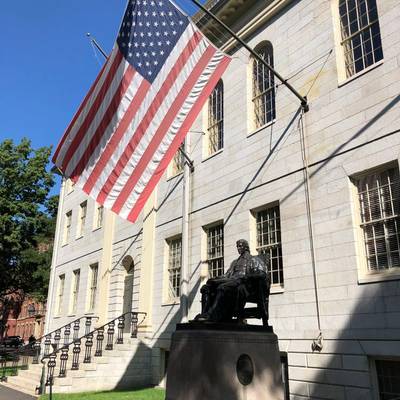“There were a lot of guests at Harvard, but we all felt very welcome,” says Fulbright Scholar Program scholarship holder Lukáš Vízek

Author: Kristýna Vávrová
When Lukáš Vízek was awarded the Fulbright-Masaryk Scholarship in the spring of 2019 allowing him to spend six months at Harvard University, USA, he knew one thing for sure – that he was taking a step into the unknown. A step that could ultimately change his future career as a scientist and researcher.
His objective was to explore the process of logical thinking in secondary school students when creating geometric structures. Apart from that he wanted to gain new experiences, get to know another university and learn about new possibilities in the field of scientific communication. How did he manage to do it?
Did you manage to collect enough material to support your research project? What would you want to apply to your work in the future? I mean at secondary schools and universities?
I have collected a lot of materials and am currently just sorting them out so that I can publish them. I have created a lot of source materials for both further research and student work. I looked forward to having normal lessons again, but as things stand, we’re going to have to wait it out (Editor’s note: The interview was made when the first wave of the COVID-19 pandemic struck).
When at Harvard you worked closely with Professor Jon Star. He supported your scholarship application, and he focuses on more or less the same line of research as you do, although he is a bit more algebra oriented. How did you two working together go?
I met with Professor Star practically every week. He is very open to cooperation. He takes an interest in other people’s work. He dedicated his time and expertise to my work. We regularly consulted on my work in person.
Who else did you work with?
I met with Professor Star every week through his task groups. He used to call it the Lab, which stands for Laboratory. It was a very diverse group made up of about 10 people. It included Chris, an American and Professor Star’s PhD student; Ashkita, an Indian and PhD student of psychology; and Soobin, originally from Korea, Professor Star’s colleague, to name just a few. Everyone’s work was openly discussed, and I got the opportunity to present my findings. We also analysed Professor Star’s work. He told us about his ideas, and everyone could comment on them. He always installed a very stimulating atmosphere, which was enriched by the fact that everyone came from a different academic background.
During your stay you also visited a primary school, at which you taught a few lessons. Was there something that caught your attention during the lessons? What are the American students like compared to our Czech students?
I got the opportunity to teach a few maths lessons at a local primary school, at which Professor Star had a small part-time job. We focused the lessons on elementary geometric constructions, and we verified my suggestions on the topic; those that emanated from the work I did as part of my Fulbright scholarship. The students were nice, open and calm. They behaved the same in class and during breaks. It seemed to me that there was no difference between these two periods of time. On the other hand, I got the impression that they were not used to strict rules in class and concentrating on difficult tasks. But I don’t want to criticize the American system of education; I didn’t spend enough time in the USA to even consider doing anything of the sort.
Your entire family relocated to the USA for a half a year, including your school-going children – how were you cared for? Did the University help you find accommodation, for example?
Harvard University would have provided us with accommodation if we had stayed for a year, so we rented a place of our own because we were only going to stay for half a year. We found it through ads, and everything went smoothly. And our children attended a public primary school. They were put in classes with the children of other guests attending local universities. Their schoolmates were usually not native speakers, because they came from all over the world. The teachers accommodated their lessons based on this fact and incorporated more English lessons in the kids’ curriculum.
The Boston region is considerably cosmopolitan, which makes it specific. This helped me get some insight not only into what is going on in our homeland, but also in the world. Time will show how our children remember their stay in the USA.

Do Fulbright scholars keep in contact?
There were 2 Czech scholars in the Boston area this year: one at the Massachusetts Institute of Technology and the other one at Boston University. Fulbright Visiting Scholars from all over the world met at events organised by WorldBoston. We used to go on trips, attend concerts or even go out for dinner every month or so. They were mostly social gatherings. And I was very glad to be a part of them.

Is there anything else that still awaits you under the scholarship programme?
As my stay came to a close, I presented my work as well as that of UHK at the local Czech Center in New York. I prepared the programme for one Science Café. My internship is now closed. But I hope and trust that we will remain in contact and that I can continue working with Professor Star and his colleagues from Harvard University.
Mgr. Lukáš Vízek, PhD
Lukáš Vízek is a didactics specialist at the Department of Mathematics of the Faculty of Science, UHK. He trains prospective maths teachers who would like to teach at second stage primary schools and at secondary schools. He cooperates with grammar schools in Hradec Králové and designs teacher training programmes with colleagues from the Department of Mathematics Education of the Faculty of Mathematics and Physics, Charles University, Prague, like the Geometry Summer School.

Section navigation: Department of Mathematics






